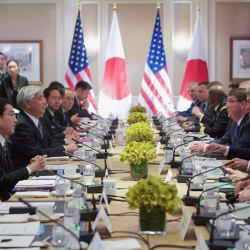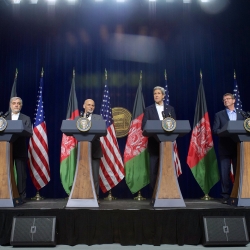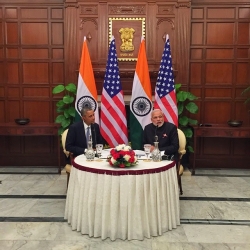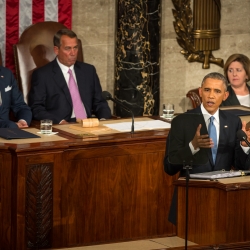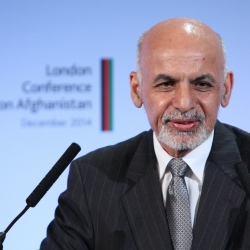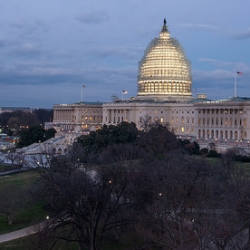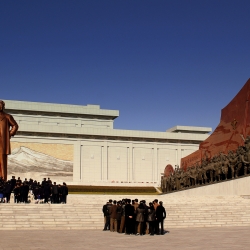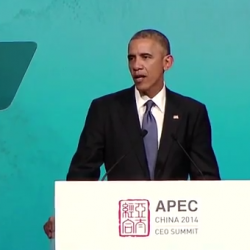Afghanistan at a Crossroads: Troop Extension the Right Call
Afghanistan at a Crossroads: Troop Extension the Right Call March 25, 2015 President Obama announced yesterday that he would adjust the timeline for the U.S. withdrawal from Afghanistan, keeping 9,800 troops in the country through the end of the year. The troops will train and assist Afghan National Security Forces and “continue to conduct targeted counterterrorism operations,” President Obama said. Speaking before a joint session of Congress this morning, Afghan President Ashraf Ghani stated his gratitude for the ongoing U.S. support to Afghanistan. The continuation of the troop presence was supported in a letter authored by the Alliance in Support of the Afghan People (ASAP) signed by NSN Advisory Board Chair Sandy Berger, NSN Executive Director John Bradshaw, and a host of Afghanistan experts and… Read More ›
Connecting the Dots: Linking Principles to Priorities in the New National Security Strategy
Connecting the Dots: Linking Principles to Priorities in the New National Security Strategy The Obama Administration has just released its 2015 National Security Strategy. The updated strategy concentrates on broad lines of effort that are crucial to American interests, ranging across the categories of security, prosperity, values, and international order. However, to have full effect, leadership is needed to transform the document’s intent into concrete priorities. Indeed, the document reads, “our resources will never be limitless. Policy tradeoffs and hard choices will need to be made.” In moving towards implementation, therefore, national security leaders have the opportunity to reassess their near-term policy priorities to make sure they are addressing long-term trends. In particular, priorities should better reflect the need to effectively deal with the security… Read More ›
Obama Building U.S.-India Strategic Partnership for the 21st Century
Obama Building U.S.-India Strategic Partnership for the 21st Century President Obama met with Indian Prime Minister Narendra Modi this weekend, their second bilateral summit since September 2014, when the two leaders announced a “renewed U.S.-India partnership for the 21st century.” Now, the United States and India are following up on that commitment with additional action to strengthen the foundation of the strategic relationship. That effort is meeting significant success, with Prime Minister Modi announcing that “Our relationship stands at a new level today” following the unprecedented invitation and attendance of President Obama at India’s 66th Republic Day. Already, agreements have been reached on a wide range of mutual interests between the two nations, including trade and investment, security, nuclear energy, and climate change. While much work… Read More ›
Implementing Obama’s “Smarter Kind of American Leadership”
Implementing Obama’s “Smarter Kind of American Leadership” Last night, President Obama in his State of the Union address touched on a host of national security issues of critical importance to the United States and international community. While his discussion of national security was broad, a key theme running through his address was the forward-looking need to reinforce America’s global position and security in the 21stcentury by emphasizing diplomatic and economic power. This “smarter kind of American leadership” applies to a number of issues, but the President’s comments on Asia, Iran, Cuba, trade strategy, and climate security in particular demonstrate the value of careful and relentless global engagement to producing results. Now armed with a clear agenda, the Administration and Congress need to work together to… Read More ›
Afghanistan at a Crossroads: Preserving Progress with International Support
Afghanistan at a Crossroads: Preserving Progress with International Support January 7, 2015 As the United States ends its combat mission in Afghanistan and President Ashraf Ghani concludes his first hundred days in office, there are reasons for cautious optimism about the country’s future as it enters a new phase of its history. President Obama’s strategic drawdown of forces in Afghanistan has ended the 13-year-long Operation Enduring Freedom while effectively preserving a U.S. security presence in the country and creating the strongest political ties with Kabul in years. Though Afghanistan’s government and people remain under constant threat, the country has made considerable gains in its development, political stability, and security. With continued international support, this progress can be consolidated and maintained. Afghan security can be preserved… Read More ›
Top Five Foreign Policy Challenges for 2015
Top Five Foreign Policy Challenges for 2015 Tomorrow, the new Congress is set to begin its first session amid a flurry of near- and mid-term foreign policy challenges that it will have the ability to affect for better or worse. Issues looming large include negotiations with Iran over its nuclear program as conservatives once again consider new counterproductive sanctions, the war against the Islamic State as American forces are being exposed to increased risk, the fate of the Guantanamo Bay detention facility as the transfer of prisoners picks up pace, managing America’s security interest in sustained nonproliferation cooperation with Russia even as Moscow misbehaves in Eastern Europe, and potentially divisive trade agreements under negotiation. On all of these issues, an effective relationship between Congress and… Read More ›
Bill French Quoted on North Korea Cyberattack by IBTimes
Is The North Korea Cyberattack On Sony An Act Of War? By Horward Koplowitz December 22, 2014 | International Business Times President Barack Obama’s declaration Sunday that the North Korean attack on Sony Pictures Entertainment was an act of “cyber vandalism” and not an act of war has far-reaching implications for the U.S. response to the crippling hack that led Sony to cancel the release of the comedy film “The Interview.” Not only was the president correct in his assessment of the incident, experts said, but characterizing the attack as “cyber vandalism” and not war minimizes the chances of escalation between the two countries. The North Korean cyberattack wasn’t an act of war because no violence was inflicted and Americans’ physical security wasn’t in danger by Sony… Read More ›
Tracking Obama’s Victories in Asia
President Obama’s trip to Asia this week exceeded most expectations, producing several landmark deals with China to advance American economic and security interests both in the region and globally, including a historic climate change agreement, reductions on tariffs, and conflict-avoidance agreements to reduce the probability of accidental crises or escalation with Beijing. These victories are the diplomatic fruit of sustained U.S. attention to the Asia-Pacific under the auspices of strategic rebalancing and lay the foundation for more progress in the future. Perhaps above all, these events signal that while China is a rising great power with a complex relationship with the United States characterized by both cooperation and sharp competition, the United States and its partners are capable of keeping China invested in the liberal… Read More ›
Sustaining America’s Support to Afghanistan the Smart Way
Today, the last of U.S. Marine Corps combat forces left Helmand Province, Afghanistan, as part of the withdrawal of American combat forces from the country by the end of this year. But a sustained commitment to Afghanistan, particularly in terms of economic and development assistance, remains solidly within U.S. interests, as a new report by the Senate Foreign Relations Committee outlines. Without continued American and international economic assistance, Afghanistan’s government faces a shortfall in resources and will be unable to fund its state institutions and security forces, putting the hard-won gains of the past decade in jeopardy. Moreover, greater conditioning of U.S. assistance to Afghanistan can deepen U.S. leverage to support reforms vital to the long-term success of the government, particularly with respect to addressing… Read More ›

